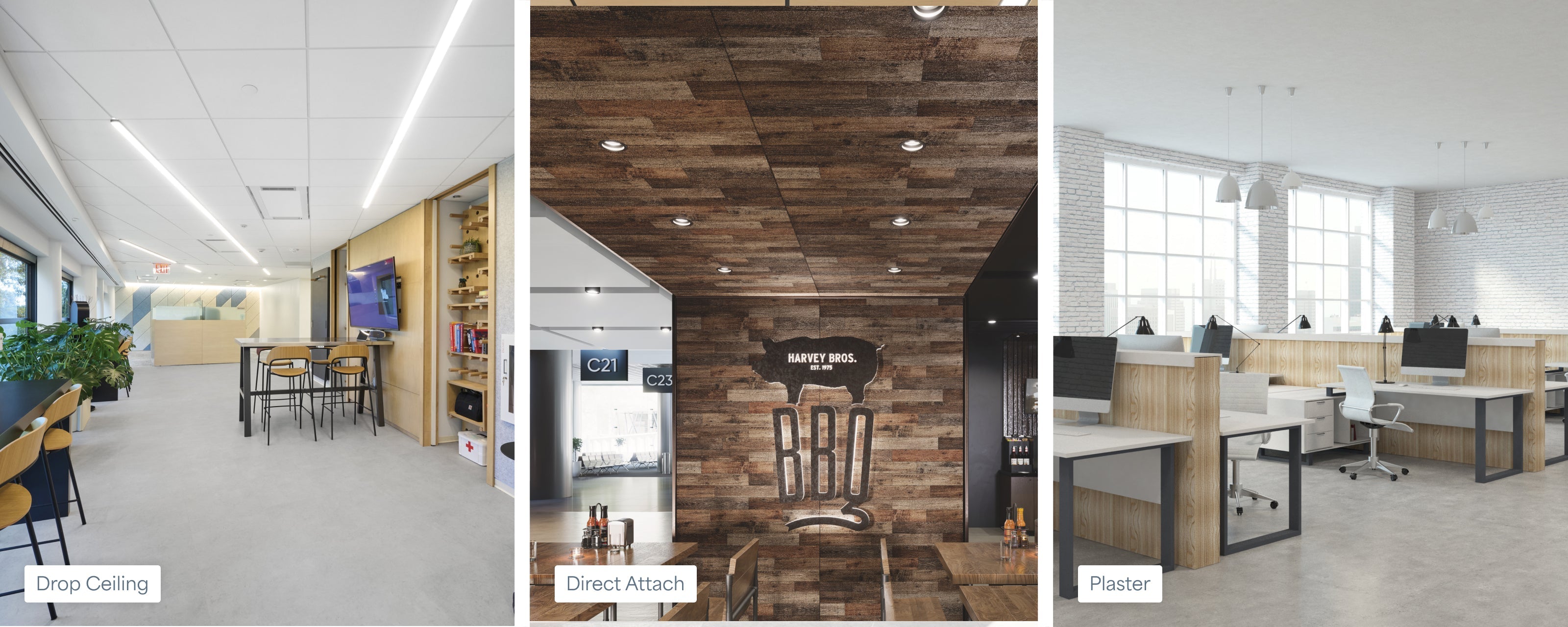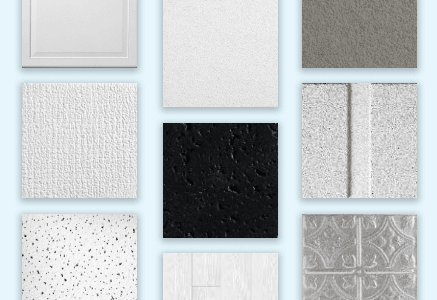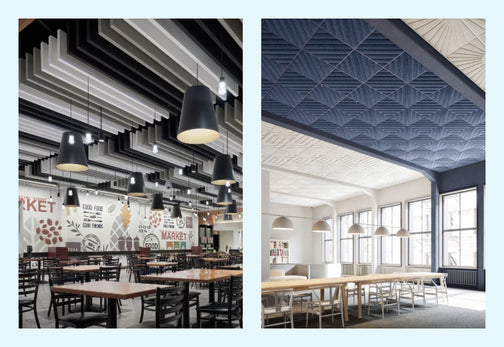Alternatives to plaster ceilings

Are plaster ceiling repairs giving you a headache?
Plaster ceilings can be found in many architectural styles, but you’ll notice them most in older buildings, Victorian designs, and Art Deco spaces. While plaster ceilings and walls have been a finishing method for centuries to create an elegant look, they are not immune to wear and tear.
A traditional plaster ceiling finish involves applying a mixture of lime with sand or cement and water to create a smooth hard surface when dried. Over time, cracks in plaster ceilings appear and repairs sometimes involve removing the plaster, which can be a mess. Plaster finishes can be expensive and they offer little to no sound absorption making spaces echo or sound uncomfortably loud.
If you’re debating on how to finish the ceiling of a new construction project or you’re dealing with cracks and looking for an alternative to plaster ceilings, we’ve got you covered.
What causes cracks in plaster ceilings?
Structural shifts, natural aging, leaks, and temperature changes are just a few of the various reasons cracks and stains appear on a plaster ceiling.

What are alternatives to plaster ceilings?
Popular plaster ceiling alternatives include installing drop or suspended ceilings with acoustic tiles or using direct-attach ceiling tiles or planks. Drywall finishes are also a popular option to consider.
The benefits of plaster ceiling alternatives
Drop ceilings
Drop or suspended ceilings with acoustic tiles are ideal for large, commercial spaces. They are affordable and versatile, offering easy access to pipes, ductwork, and other items in the plenum. From the grocery store to the dentist's office, drop ceilings are a great way to maintain a clean, uniform ceiling that helps control noise. You’ll also see drop ceilings in homes, especially in basements. They are an excellent alternative to plaster ceilings because of their low cost and ease of installation.
Direct attach ceilings

TECTUM Create! Ceiling Panels & Walls
Direct-attach ceiling panels, tiles, or planks are available in multiple materials, finishes, colors, and sizes, making them one of the most popular alternatives to plaster and drywall ceilings. Perfect for large, open commercial spaces, they help with unwanted noise and are easy to maintain. Residential spaces love installing wood looks and faux tin tiles that deliver the old-world charm without the aged, cracking plaster.
Drywall ceilings

Drywall finishes on ceilings are a common alternative to plaster ceilings because they are smooth, can easily be painted, and are typically less expensive.
Individuals looking for an alternative to plaster ceilings also want to know:
What offers more ceiling design flexibility, plaster ceilings or drop ceilings?
While plaster can be painted and applied with texture, you will find the most options in a drop ceiling or direct attach option due to the sizes, shapes, and colors of materials available. Metal, wood, felt, mineral fiber, and other modern, sustainable materials offer many performance features to suit the needs of your specific space. You can also mix products, add acoustic wall features, and choose colors and finishes to meet your desired design aesthetic.
Which ceiling finish needs to least amount of maintenance and repairs?
All building materials have their pros and cons. When it comes to the maintenance and repairs of a plaster ceiling, you’ll want to fix any leaks or areas that could be causing the cracking. The downfall of plaster is when and if you have to remove it to make repairs, which could lead to a larger project than just patching an area of the plaster ceiling. Plaster is easy to wipe clean depending on the texture and fairly low maintenance until an issue is present. Drop ceilings offer a variety of cleaning and disinfecting methods depending on your product, but overall require little maintenance until a stain appears. It’s easy to remove a tile or panel, make your repairs, and then replace the damaged tiles that match easily.
How do I decide on an alternative to plaster ceilings?
First, decide on what performance features you’re looking for, calculate your square footage, and tap into Kanopi’s resources like our How to choose ceiling tiles guide and our online selector tool that helps you narrow in on your best 3 choices.
Start your ceiling project
While plaster ceilings have their advantages, they may not always be the most practical choice, especially for larger commercial spaces or new residential construction. We encourage you to explore alternatives to plaster ceilings that offer a similar aesthetic with modern benefits. Browse alternatives to plaster ceilings, start here.
FAQ's
Can I install an Armstrong ceiling as a Do-It-Yourself project?
All of our ceiling products are considered to be contractor and DIY-friendly, depending on your skill level. Visit this Kanopi by Armstrong how-to guide to review the steps of installing a drop (or suspended) ceiling. Note that direct-attach tiles, panels, and planks are easiest to install.
How much does it cost to install a drop ceiling?
The cost to install depends on several things: products used, including their performance features and edge detail, the design of the space and products, and the grid. You can start estimating the cost of your project using this guide.




 Thanks for subscribing!
Thanks for subscribing!

